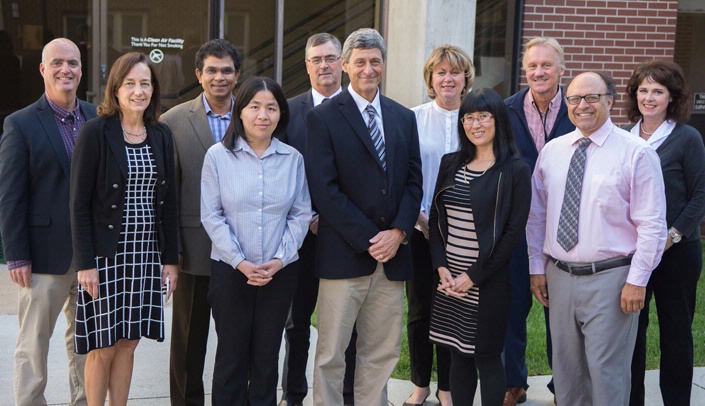As you may have heard or read, UNMC has landed two major grants from the National Institutes of Health – one for nearly $20 million will focus on clinical/translational research and on developing early career researchers into independent scientists; the other for $1.6 million will establish a pediatric clinical trials network throughout Nebraska.
The $20 million grant is the largest grant ever received by UNMC. Dr. Matt Rizzo, chair of the department of neurological sciences, is the principal investigator on this grant.
The grant is through the Institutional Development Award (IDeA) program and the NIH’s National Institute of General Medical Studies. The IDeA program broadens the geographic distribution of NIH funding by providing support to those states which don’t traditionally receive as much NIH funding as the more populous states.
As you would suspect with a grant of this magnitude and scale, Dr. Rizzo will receive plenty of support from other UNMC faculty – many of them COM members – as this moves forward.
It is an interprofessional effort that includes investigators from the colleges of medicine, nursing and public health at UNMC as well as researchers from the other eight participating institutions in Nebraska, South Dakota, North Dakota and Kansas. It will emphasize projects that will benefit people in rural areas or the medically underserved.
Most importantly, it will assist researchers in getting their careers jump started. It is designed to help early career scientists procure their first major grant and advance in academic rank. Then, as they progress in their careers, they can help mentor the next group of scientists following them. It’s the cycle of academic medicine.
The $1.6 million grant that creates a pediatric clinical trials network is headed by Dr. Jessica Snowden, associate professor of pediatrics in the department’s division of infectious diseases at UNMC and Children’s Hospital & Medical Center.
It will definitely fill a void. Historically, pediatric research has been focused in areas such as cancer, heart disease, infectious disease and neonatology. There aren’t as many large scale, multi-center studies for children as there are for adults. This grant will allow researchers to explore a much broader scope of pediatric diseases.
Research is one of the things that separates academic medical centers from other health care systems. It what advances the standards of care and thus truly makes a difference in people’s lives.
Grants like these don’t just happen. The competition is fierce. My congratulations to all the scientists who are involved in these two outstanding projects. You will be making the world a better place.
